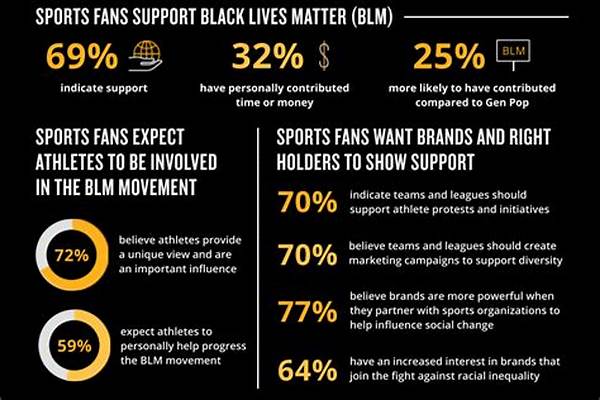How Sports Have Contributed To Social Change Globally

How Sports Have Contributed to Social Change Globally
In an ever-evolving global landscape, the ripple effects of sports stretch far beyond the stadiums and arenas where they are played. Sports hold a unique position in society, transcending borders and breaking down barriers. From the ancient Olympic Games to the FIFA World Cup, sports events have offered a stage for athletes to bring about not only exceptional performances but also significant social change. Engaging billions, sports forge a sense of unity amid diversity, embodying the potential for global impact. But, how do sports carve a path for social transformation worldwide? The answer lies in their remarkable ability to inspire, motivate, and unify communities, whilst confronting pivotal social issues – from gender equality to racial integration.
Read More : Sky Sports Live Football Presents Breaking Global Football News
Imagine attending a football match, where the electrifying atmosphere is palpable, and fans from various backgrounds come together to cheer for their team. This gathering isn’t just about a shared passion but also a silent testimony of sports uniting diverse communities, amplifying a collective voice powerful enough to drive societal change. As you read about how sports have contributed to social change globally, consider unlocking your own potential contribution to this ongoing narrative. Let sports be more than just a pastime; let them be a movement towards positive change.
Sports have a remarkable ability to attract attention, making it an influential platform for addressing social issues. In the 1960s, Muhammad Ali’s refusal to enlist in the U.S. Army, citing his opposition to the Vietnam War and racial injustices, amplified discourse on civil rights and inspired generations. After all, at its core, sports encourage values like teamwork, discipline, and resilience, mirroring the essence of societal improvement.
The Powerful Intersection of Sports and Society
Globally renowned events, such as the Olympics or World Cup, double as global stages spotlighting social issues. What makes sports so captivating is not just the thrill of competition, but its role as a catalyst for change. These events have sparked dialogues around inclusivity and equality, challenging traditional norms and breaking down societal barriers. The 2016 Rio Olympics saw remarkable participation from female athletes, pushing the conversation for gender equality to the forefront of international discussion and policy-making. Additionally, athletes such as Colin Kaepernick kneeling during the national anthem have highlighted the prevalence of systemic racism and police brutality, spurring global movements for justice and equality.
In local communities, sports create a platform for educational initiatives, health awareness, and economic development. From youth programs teaching life skills through sports to local clubs acting as community anchors, the role of sports in societal foundation is profound. They offer opportunities for personal growth, community engagement, and developing mutual respect among diverse groups.
As with any marketing strategy, storytelling is key in sports. The tales of triumph over adversity, as athletes rise against challenges, resonate with audiences on emotional and rational levels. These stories are persuasive, compelling us to act for change by drawing lessons from the field into our lives. And so, how sports have contributed to social change globally becomes an inexhaustible narrative, urging us to promote this synergy between the two.
Global Perspectives on Sports-Induced Social Change
Through creative campaigns and advocacy, sports have found ways to seamlessly integrate into the broader dialogues on social progress. Policymakers and stakeholders must harness this synergy and view sports not merely as a spectacle but a pivotal partner in transformation. The game plan for change rests in the hands of these influencers, who can leverage sports’ inherent appeal to propel a movement towards a fairer, more inclusive society.
Discussion Heading: The Global Impact of Sports on Societal Reformation
While sports undeniably entertain, their role in societal reformation is a testament to their transformative potential. Harnessing the emotional and rational appeal of sports can effectively challenge the status quo and inspire global communities to aspire for change. Various case studies and research avenues explore how sports have contributed to social change globally, emphasizing the profound impact achieved through strategic, compassionate efforts.
Globally, sports magnify societal issues, bringing them into public consciousness. Consider the powerful narrative seen in South Africa, where Nelson Mandela used the Rugby World Cup in 1995 to promote national unity post-apartheid. Mandela’s strategic embrace of sports as a tool exemplifies its capability to heal and unite, demonstrating the profound intertwining of sports and societal change.
Read More : Sky Sports News Presents Special Investigative Reports From The World Of Sports
A Closer Look: Societal Benefits Propelled by Sports
On a community level, sports programs advocate for health and well-being, embodying a preventative approach to healthcare. These initiatives, ranging from reducing childhood obesity to promoting mental health, showcase the pivotal role sports play in fostering well-rounded, healthy societies. Additionally, the economic impact of sports is significant, often creating job opportunities and stimulating local economies, leading to improved quality of life.
Yet, as the influence of sports continues to expand, it is crucial to critically analyze and conduct thorough investigations into how sports organizations and events can be utilized intentionally for social good. Furthermore, the ethical implications concerning commercialization and exploitation within sports must be examined, ensuring that the core values of sportsmanship and integrity remain intact.
In leveraging sports for societal reform, a balanced approach combining formal and informal strategies is vital. Highlighting and endorsing the transformative power of sports demands cooperation across sectors and nations, ensuring that this dynamic force continues to inspire and solidify meaningful change worldwide. Through insightful storytelling, engaging marketing strategies, and heartfelt testimonials, the narrative of how sports have contributed to social change globally will continue to evolve, motivating generations to champion this extraordinary cause.
Role Models in the Sports World
Prominent athletes serve as role models, amplifying crucial social issues on a global scale. Figures like Serena Williams advocate for gender equality and challenge stereotypes, proving that the court extends far beyond the game. These athletes utilize their platforms to inspire change, proving how sports can have a transformative social impact.
The ways in which sports bring about change are vast and varied, from empowering marginalized voices to uniting diverse populations under a common cause. As sports continue to break barriers and inspire social reform, it is the stories of triumph, resilience, and advocacy that ensure this legacy endures. Therefore, how sports have contributed to social change globally is both the narrative of today and the promise of tomorrow.



